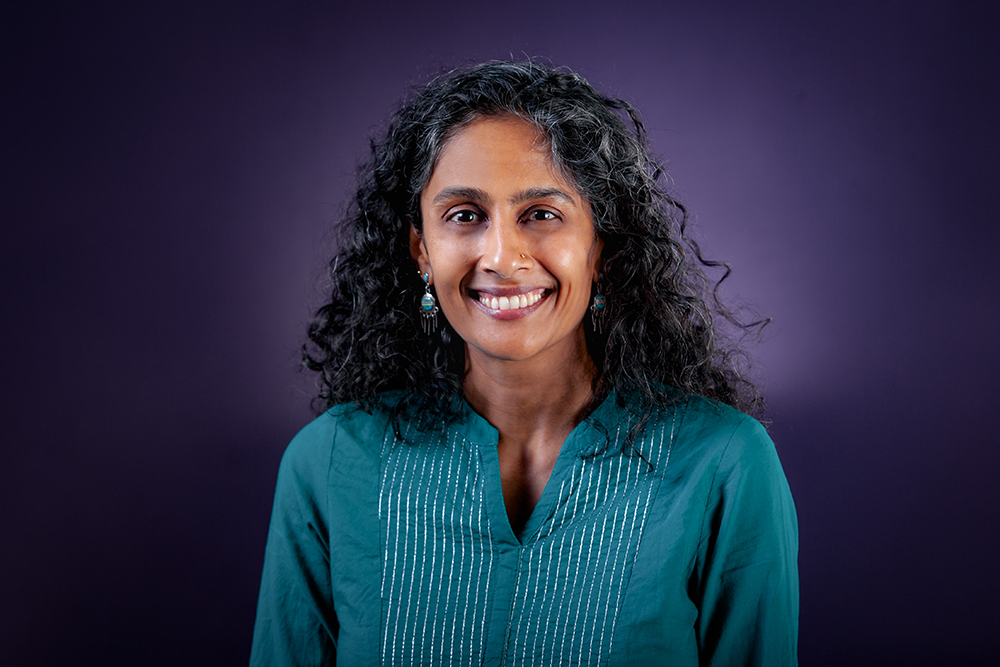From Interdisciplinary to the Real World: A Conversation with the IAS Dean

What does interdisciplinary mean? How does an interdisciplinary education help students thrive in the real world?
These are questions that Brinda Sarathy, Dean of the School of Interdisciplinary Arts & Sciences (IAS), is excited to dive into. In a recent conversation with IAS’ Student Outreach Team, Dean Sarathy shared her perspective on the School of IAS, how we support students, and why an interdisciplinary education is vital for our current reality.
What Does Interdisciplinary Mean?
Let’s start off by addressing the question on everyone’s minds: What does interdisciplinary even mean?
Though a bit of a tongue-twister, the term has become a buzzword in recent years. In short, Sarathy defines interdisciplinary as “a deepening and broadening of your understanding.” Being an interdisciplinary thinker means that you can analyze issues from multiple perspectives and engage problems with several points of view in mind. In our diverse and changing world, the ability to approach problems as truly multi-faceted, with various identities, experiences, and needs in mind is necessary.
To give a real-world example, let’s take the rapid rise of Artificial Intelligence (AI). Governments and corporations are already investing billions to expand the frontiers of AI, and companies in the private, public, and non-profit sectors are racing to develop, adopt and use large language models. An interdisciplinary engagement with AI would not only focus on the technological skills to develop infrastructure and software, but also zoom out to consider broader social, ethical, and ecological implications.
For instance, how might environmental sustainability be factored into decisions about the adoption and use of AI? How can AI models reduce their immense carbon footprints given the reality of climate change? In what ways might new technology be optimized to mitigate social and economic harms? What might we be overlooking in the AI race for profits? Asking such interdisciplinary (and sometimes uncomfortable) questions can help us think more proactively and ethically about complex challenges and be prepared to lead, navigate, and collaborate in times of rapid change.
At the end of an interdisciplinary education is a well-rounded professional who is not only technically skilled, but also deeply aware of the world we live in. This combination makes IAS graduates uniquely qualified in today’s job market.
Being an interdisciplinary thinker means that you can analyze issues from multiple perspectives and engage problems with several points of view in mind. In our diverse and changing world, the ability to approach problems as truly multi-faceted, with various identities, experiences, and needs in mind is necessary.
Prioritizing Student Success
Some people may be familiar with the old concept of a college professor asking students to look to their left and right, and asserting that at least one of their classmates will not graduate with them. The School of IAS, and UW Bothell broadly, pushes back on that concept. “UW Bothell is there to meet students where they’re at and to help them get where they need to be,” says Dean Sarathy, “we are deeply committed to access.”
In IAS, this looks like ensuring students have the information and resources they need to thrive. This commitment shows up outside the classroom, through advising and community-building efforts, and in the classroom. “Our professors go out of their way to make sure they aren’t assuming students know what a concept is or how to navigate it. They want to ensure that students are well informed,” the Dean explains. The School of IAS is a place that prides itself on the success of our students, and we do all that we can to ensure they succeed.
At the end of an interdisciplinary education is a well-rounded professional who is not only technically skilled, but also deeply aware of the world we live in. This combination makes IAS graduates uniquely qualified in today’s job market
An Inclusive Community, that Leads with Care
Student success is more than passing classes and finding jobs. A successful college experience will also help students find community and lifelong connections. Dean Sarathy wants students to know they belong here. She explains that “if you care about an education that is affordable, with smaller classes, and want to be with other students who are working class, students of color, or first-generation college students, you won’t feel alone here.” That inclusivity lays the foundation for a vibrant IAS community, full of people who care about each other and stay connected to one another long after graduation.
What does it mean to have an inclusive community? It means that you do not need to be a specific “type” of student to thrive in IAS. If you want to do well here, Sarathy only asks that you bring “a sense of curiosity, be open to possibilities, a willingness to go outside of your comfort zone, and reach out for help if you need it.” If you are willing to bring your best self, IAS is a place where you can “meet other people, find mentors intergenerationally, explore classes you might not have thought about before, and get exposed to new ways of looking at things.”
When asked what drives her passion for serving IAS as dean, Sarathy simply says “seeing our students and faculty in action.” IAS is a special place, and for anyone wanting to learn more, we encourage you to explore our academic programs, connect with us on social media, or review our open admission requirements.
